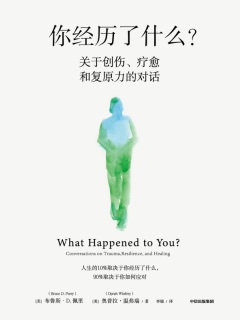心理学
类型
8.5
豆瓣评分
可以朗读
语音朗读
152千字
字数
2022-01-01
发行日期
展开全部
主编推荐语
痛苦不会凭空消失,时间也不会冲淡一切。我们的所有创伤,大脑和身体都会深深记住。这本书将改变你看待人生的方式。
内容简介
生而为人,不代表我们都能顺利地长大成人。在生命早期,我们可能被忽视,被贬低,被冷漠对待,缺乏支持和关爱;在成长过程中,我们可能遭遇暴力、背叛、控制、伤害、分手、离婚、失去亲人……这些糟糕的事件或经历,叫作创伤。
这些创伤强行改变了我们的大脑,让我们困在过去无法走出来。我们所经历的一切,塑造了我们今天的样子,会定义我们的每一段关系、每一次互动和每一个决定。
三十多年来,奥普拉·温弗瑞和儿童精神科医师、神经科学家布鲁斯·D.佩里医生一直在探讨创伤、大脑、复原力以及疗愈的问题,他们在这本书中以十次私人对话加真实案例的方式,向我们阐明了这一切背后的神经科学逻辑。
我们今天的消极情绪、负面心态、异常行为,都是有来源的,如果你想获得疗愈,你就要追根溯源,不要再质疑自己“出了什么问题”,而是要回顾“你经历了什么”。
这是我们的希望所在——我们神奇的大脑具有独特的适应性和可塑性,理解大脑对于压力和早期创伤会做出怎样的反应,我们就能把过去从现在的生活中剥离开来,重建命运,夺回人生的掌控权。
目录
- 版权信息
- 作者手记
- 导言
- 第一章 理解世界
- 第二章 寻求平衡
- 第三章 我们是如何被爱的
- 第四章 创伤的光谱
- 第五章 连点成线
- 第六章 从应对到疗愈
- 第七章 创伤后的智慧
- 第八章 我们的大脑,我们的偏见, 我们的社会系统
- 第九章 当代世界的关系贫困
- 第十章 现在我们需要什么
- 结语
- 延伸阅读
- 推荐书目
- 如果想了解更多:
- 致谢
展开全部
出版方
中信出版集团
中信出版社,成立于1988年,隶属于中国中信集团公司,是全国中央级出版社。2008年改制为中信出版股份有限公司。 中信出版集团满怀激情,关注思想、关注理念、关注人物、关注资讯、关注时尚,为读者提供最前沿的思想与最优秀的学习实践,通过有价值的、有享受的阅读,倡导与展示新的文化主流,启动一个“大众阅读时代”。

